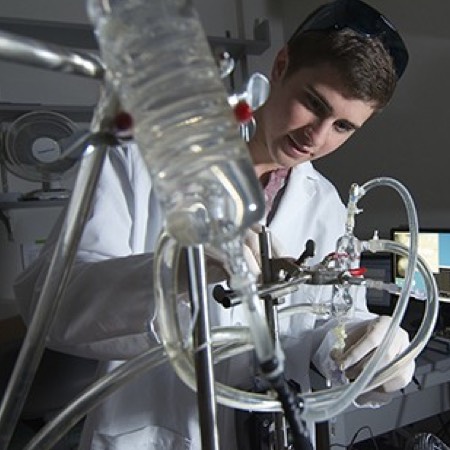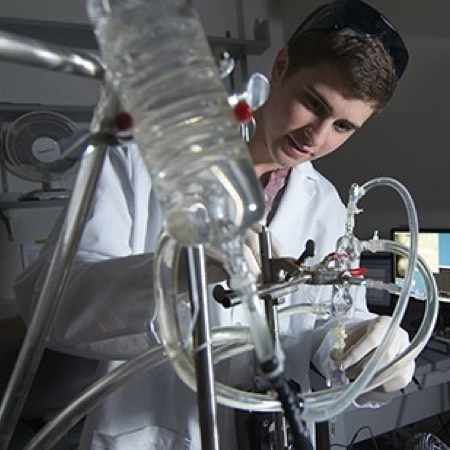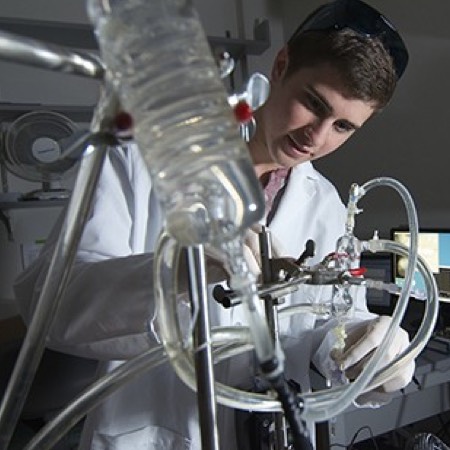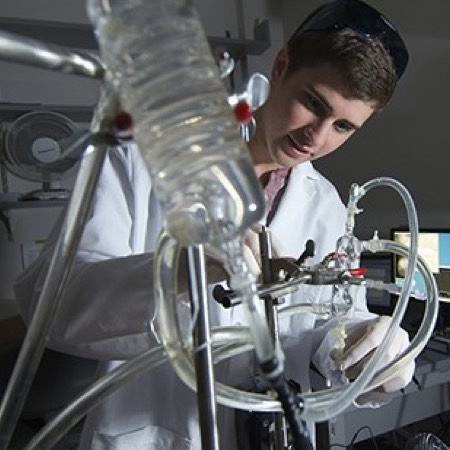Clinical Psychology Graduate Programs
WITH THESIS
The minimum total number of credits required for a Master's Degree : 36, ECTS: 251 (183 + 8 + 60)
Number of Must Cources: 8 / Number of Elective Cources: 5
| Course Code | Course Name | Theoric | Practical | Credits | ECTS |
| FALL | |||||
| PSİ 540 | Ethics in Clinical Psychology | 3 | 0 | 3 | 9 |
| -- | Elective Course | 3 | 0 | 3 | 9 |
| -- | Elective Course | 3 | 0 | 3 | 9 |
| -- | Elective Course | 3 | 0 | 3 | 9 |
| SPRING | |||||
| PSİ 501 | Advanced Research Methods and Statistics | 3 | 0 | 3 | 9 |
| -- | Elective Course | 3 | 0 | 3 | 9 |
| -- | Elective Course | 3 | 0 | 3 | 9 |
| SUMMER | |||||
| PSİ 510 | Practicum in Clinical Psychology I | 0 | 4 | 2 | 16 |
| PSİ 511 | Psychotherapy Supervision I | 0 | 6 | 3 | 24 |
| FALL | |||||
| PSİ 520 | Practicum in Clinical Psychology II | 0 | 4 | 2 | 16 |
| PSİ 521 | Psychotherapy Supervision II | 0 | 6 | 3 | 24 |
| PSİ 590 | Seminar | 0 | 0 | 0 | 8 |
| PSİ 599 | Master's Thesis | 0 | 0 | 0 | 0 |
| SPRING | |||||
| PSİ 530 | Practicum in Clinical Psychology III | 0 | 4 | 2 | 16 |
| PSİ 531 | Psychotherapy Supervision III | 0 | 6 | 3 | 24 |
| PSİ 599 | Master's Thesis | 0 | 0 | 0 | 0 |
| SUMMER | |||||
| PSİ 599 | Master's Thesis | 0 | 0 | 0 | 60 |
WITHOUT THESIS
The minimum total number of credits required for a Master's Degree: 31, ECTS: 143
Number of Must Cources: 6 / Number of Elective Cource: 5
| Course Code | Course Name | Theoric | Practical | Credits | ECTS |
| FALL | |||||
| PSİ 540 | Ethics in Clinical Psychology | 3 | 0 | 3 | 9 |
| -- | Elective Course | 3 | 0 | 3 | 9 |
| -- | Elective Course | 3 | 0 | 3 | 9 |
| -- | Elective Course | 3 | 0 | 3 | 9 |
| SPRING | |||||
| PSİ 501 | Advanced Research Methods and Statistics | 3 | 0 | 3 | 9 |
| PSİ 510 | Practicum in Clinical Psychology I | 0 | 4 | 2 | 16 |
| PSİ 511 | Psychotherapy Supervision I | 0 | 6 | 3 | 24 |
| -- | Elective Course | 3 | 0 | 3 | 9 |
| -- | Elective Course | 3 | 0 | 3 | 9 |
| SUMMER | |||||
| PSİ 520 | Practicum in Clinical Psychology II | 0 | 4 | 2 | 16 |
| PSİ 521 | Psychotherapy Supervision II | 0 | 6 | 3 | 24 |
| PSİ 598 | Term Project | 0 | 0 | 0 | 0 |
ELECTIVE COURCES |
|||||
| PSİ 502 | Qualitative Research Methods in Psychology | 3 | 0 | 3 | 9 |
| PSİ 541 | Clinical Assessment | 3 | 0 | 3 | 9 |
| PSİ 542 | Assessment of Intellectual Functioning | 3 | 0 | 3 | 9 |
| PSİ 543 | Neuropsychological Assessment | 3 | 0 | 3 | 9 |
| PSİ 544 | Personality Assessment | 3 | 0 | 3 | 9 |
| PSİ 545 | Clinical Assessment of Child and Adolescent | 3 | 0 | 3 | 9 |
| PSİ 546 | Diagnostic Assessment and Psychopharmacological Treatment | 3 | 0 | 3 | 9 |
| PSİ 551 | Advanced Clinical Psychology | 3 | 0 | 3 | 9 |
| PSİ 561 | Developmental Psychopathology | 3 | 0 | 3 | 9 |
| PSİ 562 | Child and Adolescent Psychotherapy | 3 | 0 | 3 | 9 |
| PSİ 571 | Adult Psychopathology and Psychotherapy I | 3 | 0 | 3 | 9 |
| PSİ 572 | Adult Psychopathology and Psychotherapy II | 3 | 0 | 3 | 9 |
| PSİ 573 | Cognitive Behavioral Therapy | 3 | 0 | 3 | 9 |
| PSİ 574 | Schema Therapy | 3 | 0 | 3 | 9 |
| PSİ 575 | Psychodynamic Psychotherapies | 3 | 0 | 3 | 9 |
| PSİ 576 | Group Therapies | 3 | 0 | 3 | 9 |
| PSİ 577 | Family and Couple Therapies | 3 | 0 | 3 | 9 |
| PSİ 578 | Mindfulness-based Therapies | 3 | 0 | 3 | 9 |
| PSİ 579 | Comparative Approaches to Psychotherapy | 3 | 0 | 3 | 9 |
| PSİ 581 | Psychology of Trauma, Disaster and Crisis | 3 | 0 | 3 | 9 |
| PSİ 582 | Health Psychology | 3 | 0 | 3 | 9 |
| PSİ 583 | Emotions | 3 | 0 | 3 | 9 |
| PSİ 584 | Topics in Clinical Psychology | 3 | 0 | 3 | 9 |
COURSES WITH PREREQUISITES |
|||||
| PSİ 520 | Practicum in Clinical Psychology II | Precondition PSİ 510 | |||
| PSİ 521 | Psychotherapy Supervision II | Precondition PSİ 511 | |||
| PSİ 530 | Practicum in Clinical Psychology III | Precondition PSİ 520 | |||
| PSİ 531 | Psychotherapy Supervision III | Precondition PSİ 521 | |||
| PSİ 572 | Adult Psychopathology and Psychotherapy II | Precondition PSİ 571 | |||
Courses offered in other graduate programs within the Graduate School of Social Sciences can be taken subject to the approval of the advisor.
Course Contents
Must Courses:
PSİ599 Master’s Thesis (0-0)0 ECTS: 60.0
Master’s thesis studies aim to provide students with research experience on topics relevant to clinical psychology. The students conduct studies using proper scientific methods to answer their research questions regarding assessment, diagnosis, psychopathology, psychotherapy and other areas of clinical psychology, analyze data, present findings and discuss contributions to the literature.
PSİ590 Seminar (0-0)0 ECTS: 8.0
The aim of this course is to guide the students in making an extensive literature review of thesis subjects and formulating possible research questions. The students are supervised with feedback about proper methodology for their research questions, instruments and methods for data collection, and contributions of their studies to the literature.
PSİ598 Term Project (0-0)0 ECTS: 0.0
In this course, the students enrolled in the M.Sc. without thesis program are expected to increase their knowledge and skills related to the scientific methodology in topics related to clinical psychology. The project includes a review of the relevant literature, formulating research questions and specifying methods, collecting and analyzing data, and discussing results. The students present their work in a report.
PSİ501 Advanced Research Methods and Statistics (3-0)3 ECTS: 9.0
In this course, the students in graduate programs are expected to increase their knowledge and skills related to methods frequently used in psychology research. The students learn advanced statistical methods such as multiple regression, multivariate analysis of variance, between and within groups comparisons, and mediation and moderation analyses in this course. They also gain skills in using computer softwares for making those analyses, and in interpreting and reporting analysis findings.
PSİ510 Practicum in Clinical Psychology I (0-4)2 ECTS: 16.0
In this course, the students are expected to gain experience in observation and application in areas of clinical psychology under the supervision of a mental health professional.
PSİ520 Practicum in Clinical Psychology II (0-4)2 ECTS: 16.0
In this course, the students are expected to gain experience in observation and application in areas of clinical psychology under the supervision of a mental health professional.
PSİ530 Practicum in Clinical Psychology III (0-4)2 ECTS: 16.0
In this course, the students are expected to gain experience in observation and application in areas of clinical psychology under the supervision of a mental health professional.
PSİ511 Psychotherapy Supervision I (0-6)3 ECTS: 24.0
The aim of this course is to provide students group supervision in specific psychotherapy approaches. In this course, through the discussion of cases, fostering clinical skills such as formulation, assessment, treatment planning, applying therapy techniques, and evaluating therapy effectiveness is aimed.
PSİ521 Psychotherapy Supervision II (0-6)3 ECTS: 24.0
The aim of this course is to provide students group supervision in specific psychotherapy approaches. In this course, through the discussion of cases, fostering clinical skills such as formulation, assessment, treatment planning, applying therapy techniques, and evaluating therapy effectiveness is aimed.
PSİ531 Psychotherapy Supervision III (0-6)3 ECTS: 24.0
The aim of this course is to provide students group supervision in specific psychotherapy approaches. In this course, through the discussion of cases, fostering clinical skills such as formulation, assessment, treatment planning, applying therapy techniques, and evaluating therapy effectiveness is aimed.
PSİ540 Ethics in Clinical Psychology (3-0)3 ECTS: 9.0
In this course, ethical issues regarding scientific research, publications, and professional applications in clinical psychology are discussed, and students gain knowledge and skills about ethical values, ethical decision making and problem solving, different approaches to ethical issues (e.g., theological and deontological), and ethical codes by professional organizations including American Psychological Association and Turkish Psychological Association.
Elective Courses:
PSİ502 Qualitative Research Methods in Psychology (3-0)3 ECTS: 9.0
In this course, it is aimed to provide basic information about how research questions of psychology are approached with qualitative research methods. Subjects of epistemological and ontological assumptions on which qualitative research is based; the equivalents of concepts, such as validity and reliability, specific to quantitative methods in qualitative research; and qualitative data sources are primarily discussed. Additionally, widely used data analysis methods such as thematic analysis, interpretative phenomenological analysis, grounded theory, narrative analysis, and conversation analysis are introduced. Mixed method research examples are also examined. Finally, the principles of an eligible qualitative research and major issues regarding reporting and publishing qualitative findings are emphasized.
PSİ541 Clinical Assessment (3-0)3 ECTS: 9.0
This course aims to enable students to acquire assessment and interviewing skills that can be specifically utilized in clinical psychology research and interventions. Students gain theoretical and practical knowledge on the purposes of evaluation in clinical psychology and the most appropriate techniques in evaluating the psychological processes they aim to obtain information. They develop basic skills in subjects such as behavioral observation, initial interview, and psychological anamnesis in the study areas of clinical psychology and perform brief practices in the classroom environment. In addition, they get to know the assessment tools that are frequently used for screening and monitoring the symptoms of psychological disorders.
PSİ542 Assessment of Intellectual Functioning (3-0)3 ECTS: 9.0
This course aims to increase knowledge and skills regarding the assessment of intellectual functioning which is implied in the development of fundamental and unique theories and instruments for assessing psychological functioning. This course covers topics including fundamental theories of intelligence, current instruments used for assessing intelligence, and making and interpreting intelligence assessments. The students will also be able to learn about current testing batteries which are frequently used to assess intellectual functioning of children and adults in Turkey and worldwide.
PSİ543 Neuropsychological Assessment (3-0)3 ECTS: 9.0
In this course, the students learn about fundamentals of neuropsychological assessment which includes techniques based on performance for assessing cognitive functioning, and explore sensory, motor, emotional and functional outcomes of conditions such as brain injury, brain diseases and severe mental disorders. This course also covers several specific topics in neuropsychological assessment including obtaining diagnostic information, differential diagnostics, assessment of response to treatment, and prediction of functional recovery.
PSİ544 Personality Assessment (3-0)3 ECTS: 9.0
In this course, students learn about assessment methods used for understanding affective and behavioral patterns, chronic psychopathological processes, and personality traits which extensively influence different areas of individuals’ lives. The course includes theoretical and applied exercises for commonly used objective (e.g., Minnesota Multiphasic Personality Inventory) and projective (e.g., Thematic Apperception Test, Rorschach Inkblot Test) methods in the field
PSİ545 Clinical Assessment of Child and Adolescent (3-0)3 ECTS: 9.0
This course aims to provide students with basic knowledge and skills about the evaluation of neurodevelopmental disorders such as conduct disorders, affective disorders, Attention Deficit and Hyperactivity, speech disorders, learning disorders, and motor disorders, which are frequently encountered in childhood and adolescence. In this context, interviews with children and adolescents and their families, selection of appropriate assessment tools, principles of application of these tools and ethical and professional issues specific to child and adolescent evaluation are discussed.
PSİ546 Diagnostic Assessment and Psychopharmacological Treatment (3-0)3 ECTS:9.0
In this course, the principles of classifying and evaluating psychological symptoms based on systems such as the Diagnostic and Statistical Manual of Mental Disorders (DSM) and the International Classification of Diseases (ICD) are addressed. In addition, students are expected to gain a perspective on current approaches to psychopharmacological treatment of disorders. How these approaches are integrated with psychosocial interventions and their effectiveness are discussed in accordance with scientific research.
PSİ551 Advanced Clinical Psychology (3-0)3 ECTS: 9.0
This course aims to facilitate in-depth study and discussion of specific topics in clinical psychology. This course covers topics including but not limited to methodological and theoretical debates in research and applied areas which are current developing in the field of clinical psychology, review of current findings from a critical perspective, progress and state of the art of clinical psychology in Turkey and the world, and the relationship between clinical psychology, other subfields of psychology or disciplines.
PSİ561 Developmental Psychopathology (3-0)3 ECTS: 9.0
This course covers frequently observed psychological disorders in childhood and adolescence. Topics relevant for both clinical and developmental psychology are discussed. Those topics mainly include risk and maintaining factors for childhood and adolescence psychopathology, classification of disorders, assessment, impact of developmental psychopathology on the development of adult psychopathology, and common intervention approaches. Among developmental psychopathological conditions, detailed information on conduct disorder and adjustment disorder in childhood, anxiety disorders, mood disorders, attention deficit and hyperactivity, autism, learning disorders and other problems are given.
PSİ562 Child and Adolescent Psychotherapy (3-0)3 ECTS: 9.0
This course focuses on developmental psychopathology and intervention approaches for problems of children, adolescents, and their families. The course covers fundamentals of child-adolescent psychotherapy and ethical issues, and different psychotherapy approaches.
PSİ571 Adult Psychopathology and Psychotherapy I (3-0)3 ECTS: 9.0
This course focuses on teaching how problems and psychopathological patterns that have dysfunctional effects on adults can be handled in the context of psychotherapy. Issues common to all psychotherapy approaches such as evidence-based psychotherapies, common factors affecting the effectiveness of psychotherapy, mechanisms of change in psychotherapy, and therapeutic alliance are reviewed. Then, how psychological disorders are formulated in accordance with the goals and assumptions of psychotherapy, psychotherapy planning, determining the goals of psychotherapy, and psychotherapy termination are discussed.
PSİ572 Adult Psychopathology and Psychotherapy II (3-0)3 ECTS: 9.0
Continuing from Adult Psychopathology and Psychotherapy I, this course provides conceptual and applied examples for approaches to psychological treatment of specific psychological disorders (e.g., anxiety disorders, depression, eating disorders), the most effective methods of intervention, psychotherapy planning for specific disorders, and intervention.
PSİ573 Cognitive Behavioral Therapy (3-0)3 ECTS: 9.0
Cognitive-Behavioral Therapy, which is a psychotherapy approach based on the relationship of emotion, thought and behavior in understanding and intervening psychological problems, is introduced and its practical principles are explained in this course. The history and pioneers of Cognitive-Behavioral Therapy, the assumptions based on theories and research findings, its structure, techniques, and issues related to its effectiveness are included. Students gain detailed information about the rationale and applications of the techniques used in Cognitive-Behavioral Therapy interventions.
PSİ574 Schema Therapy (3-0)3 ECTS: 9.0
The theoretical foundations and practical principles of Schema Therapy which is an integrative theory and therapy approach integrating cognitive, behavioral, interpersonal and experiential techniques, is designed for psychological disorders that are difficult to change and have obvious origins in childhood and adolescence are taught in this course.
PSİ575 Psychodynamic Psychotherapies (3-0)3 ECTS: 9.0
In this course, classical psychoanalytic thought and following ego psychology, object relations theory, self psychology, relational psychoanalysis, and contemporary psychoanalytic approaches and psychodynamic therapies developed based on these approaches are covered. The differences and similarities between psychodynamic therapies and other psychotherapy schools, scientific research approaches on their effectiveness, evidence-based practices, techniques commonly used in the application of psychodynamic therapies, and psychotherapy framework constitute the major topics of this course.
PSİ576 Group Therapies (3-0)3 ECTS: 9.0
Group therapies course is aimed to provide the basic information about group intervention methods used in clinical psychology. Therefore, it is carried out with an integrative perspective that includes different group therapy approaches. In this course, psychoeducation, counseling and psychotherapy groups designed as short or long term, open or closed, differing according to their purposes and problem areas are introduced. Questions related to how to plan a group intervention, the clinical skills expected for a group leader, co-therapist practice, selection of group members, and the predicted developmental stages to achieve group goals are answered. In addition, issues such as general ethical regulations in clinical psychology as adapted to group practices (e.g., information confidentiality) and cultural diversity are touched upon within the framework of the current literature.
PSİ577 Family and Couple Therapies (3-0)3 ECTS: 9.0
In this course, students learn the basics of general systems theory and the major assumptions of various theoretical approaches in the field of family therapy. Mainly, theorists such as Minuchin, Bowen and Satir who developed applications in the field of family therapy and structural, multi-generational and experiential models of these theorists are referred. Selected topics to be covered in the course will include traumatic family/life events, psychosomatic families, aging families, extended families, single parent families and remarried families.
PSİ578 Mindfulness-based Therapies (3-0)3 ECTS: 9.0
Psychological intervention approaches such as Mindfulness-based Cognitive Therapy and Acceptance and Commitment Therapy, which are identified as new generation mindfulness-based psychotherapies, are explained in this course. The concept of mindfulness, psychological processes related to mindfulness, the relationship of mindfulness to emotion regulation and stress responses, and the relationship of mindfulness-based psychotherapies with other psychotherapy approaches constitute the main topics of the course. In addition, the basic principles and intervention methods of these approaches, effectiveness studies and predictions about the near future are included.
PSİ579 Comparative Approaches to Psychotherapy (3-0)3 ECTS: 9.0
This course aims to examine different approaches developed in the history of clinical psychology in terms of what psychotherapy is, its basic assumptions, goals, and basic techniques used to achieve these goals from a broad perspective. For this purpose, first wave psychodynamic therapies, second wave cognitive-behavioral therapies, third wave humanistic therapies, and fourth wave holistic therapies are examined comparatively. The final goal of the course for students is to comprehend the similarities and differences between these approaches from a critical perspective.
PSİ581 Psychology of Trauma, Disaster and Crisis (3-0)3 ECTS: 9.0
This course is designed to provide students with a general perspective on psychological and social aspects of natural and human-made disasters. The course covers topics such as disaster risk management, preparedness and response, methods and challenges in disaster research, the importance of facilitating community participation, psychological stress and growth in disaster survivors, and psychological intervention methods which can be used with emergency workers and volunteers.
PSİ582 Health Psychology (3-0)3 ECTS: 9.0
This course covers theoretical foundations and current research findings on issues of interest to health psychology and that intersect with clinical psychology. Students acquire in-depth knowledge on the relationship between physical and mental health, emotional basis of physical illnesses, personality factors affecting health behavior, stress, cultural and environmental factors affecting physical and mental health, and the role of mental health professionals in the health system and their service areas. They also get familiar with behavioral and psychological intervention programs that can be used in situations where biopsychosocial factors considered together such as smoking cessation, digital addiction, diet, exercise, and coping with chronic and fatal diseases.
PSİ583 Emotions (3-0)3 ECTS: 9.0
Emotions course is carried out in two focus areas. The first half of the course covers topics such as how different approaches in psychology (e.g., biological, social, developmental, clinical) define emotions and classify primary and secondary emotions. Emotional intelligence, emotion regulation, the relationship between the emotions and cognitions, and effects of culture on emotions are also included. In the second half of the course, specific emotions such as fear, anxiety, sadness, anger, disgust, joy, shame, guilt as primary and secondary emotions are introduced. Issues that are closely related to clinical psychology such as the biological basis for each specific emotion, its developmental roots, social expression, and most importantly how it is classified as normal and abnormal, and the role of specific emotions in psychopathologies are discussed.
PSİ584 Topics in Clinical Psychology (3-0)3 ECTS: 9.0
This course is an interactive course that aims to address topics such as emerging fields of clinical psychology (e.g. virtual reality in psychotherapy), interdisciplinary theories and practices (e.g., neurocognitive foundations of psychopathologies), and cultural influences (e.g., discrimination). The goal is to enrich the knowledge and awareness of the students on many current issues that coincide with clinical psychology and to come together with experts working in the field and/or in interdisciplinary fashion. For this purpose, the course is designed as weekly seminars by inviting experts from different fields in convenient academic semesters.





